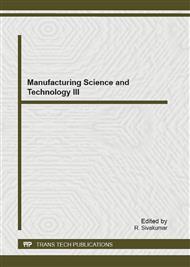p.112
p.117
p.122
p.130
p.136
p.142
p.147
p.152
p.158
Optimization of Total Material Processing Time in a Manufacturing Flow Shop Environment
Abstract:
Due to the pressure in a shop floor to complete a set of jobs within due date, all the materials are to be processed within a minimum possible time. This is linked to the problem of finding an optimal sequence in terms of total completion time (Make Span) for processing ‘n’ jobs in ‘m’ processing centers in the shop floor. The problem is NP hard as the total number of sequences is (n!) for a permutation flow shop scheduling problem. In the shop floor, due to the limitation in the computing capabilities and computer knowledge, still the Classical heuristics are popular because of their simplicity. However, in most of the cases, we get only one sequence except in CDS algorithm where the best sequence is selected from (m-1) alternatives. This paper deals with optimization of total material processing time in a manufacturing flow shop using the concept of Dummy Machine in one Heuristics proposed by the authors, based on the Pascal’s triangle. In such cases, more sequences having make spans which may be optimal/ near optimal can be obtained. This results in optimization of total material processing time and enables the shop floor supervisor to complete the jobs within a minimum possible time.
Info:
Periodical:
Pages:
136-141
Citation:
Online since:
December 2012
Authors:
Keywords:
Price:
Сopyright:
© 2013 Trans Tech Publications Ltd. All Rights Reserved
Share:
Citation:


